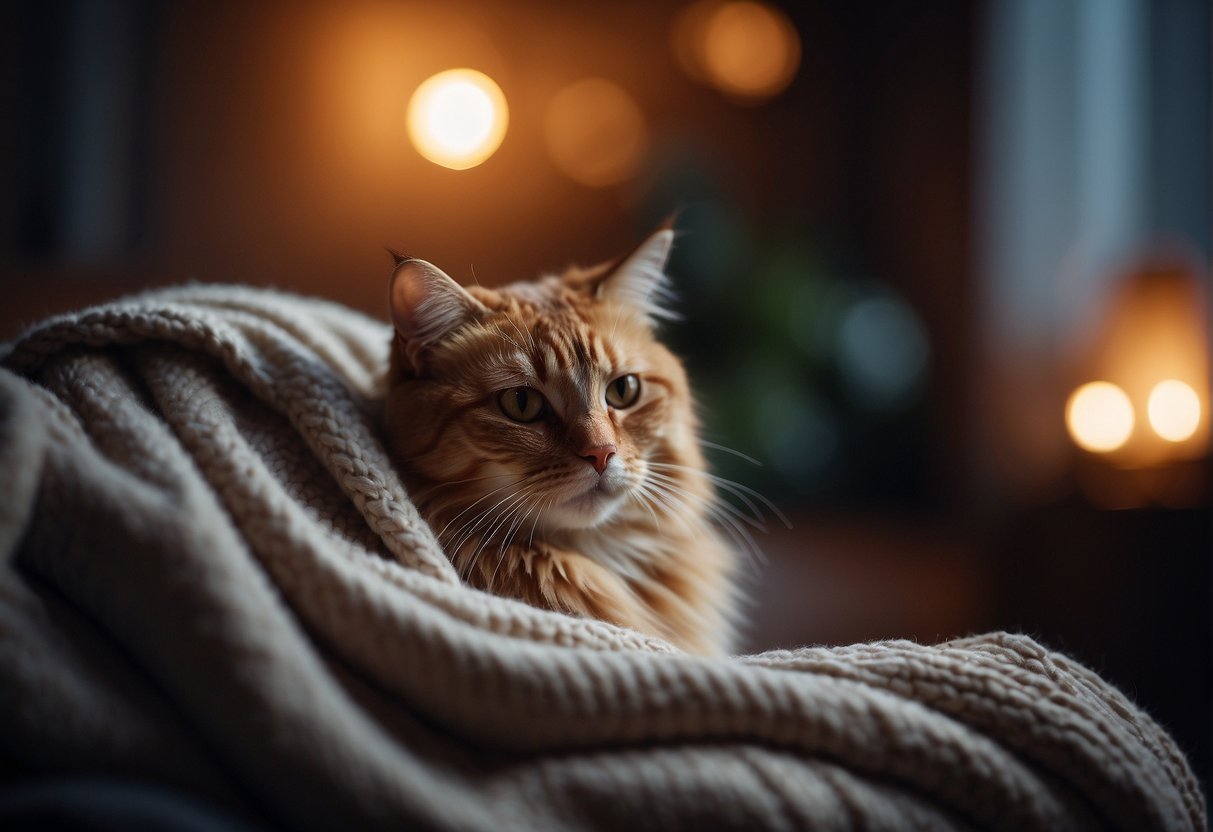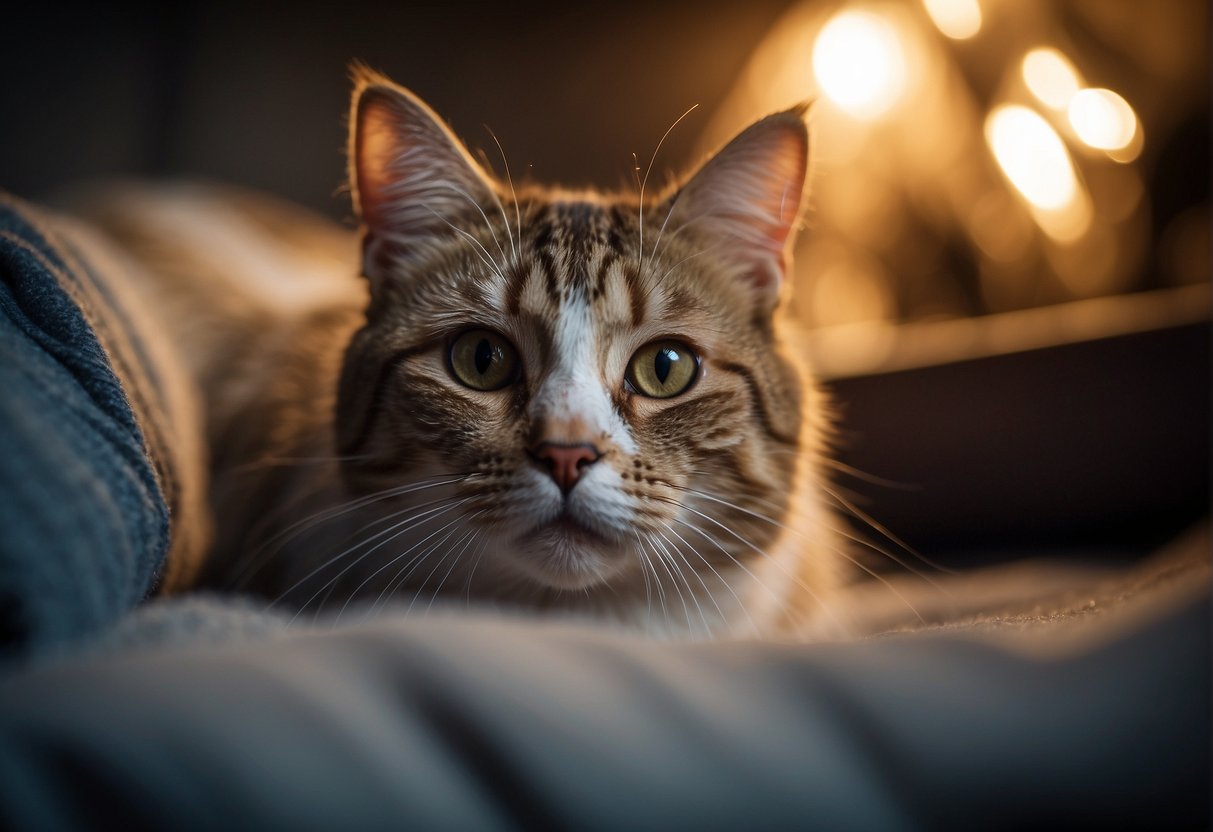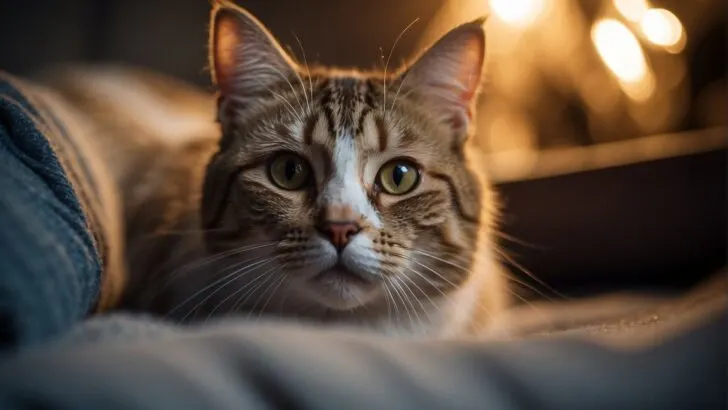Calming a cat during fireworks can be a challenge, as the loud noises and bright flashes can cause significant stress for your feline friend. From my experience, the abrupt, booming sounds of fireworks often send cats scurrying for cover.
To maintain a sense of calm, it’s essential to create a safe and secure environment inside your home. One of the best strategies I’ve found is setting up a cozy hiding place that muffles the sound—like a padded box or a closet with their favorite blanket.

Beyond offering a physical retreat, helping your cat stay calm also requires some proactive measures. Playing gentle background music or white noise can effectively drown out the more frightening fireworks sounds.
Moreover, staying calm yourself can influence your cat’s mood, since they can pick up on your emotional cues. I’ve also seen that engaging them with toys or treats can be a good distraction to keep their mind off the noise outside.
While some cats might cope by simply snoozing on a cushion, others might need extra attention. Paying close attention to your cat’s behavior during these events will help you understand their needs better and make fireworks less of a fiasco.
Feline Stress Triggers

Cats are sensitive creatures and can easily become stressed in the face of loud or unfamiliar noises.
Effects of Fireworks on Cats
Fireworks produce sudden, intense sounds and bright flashes that can be terrifying to cats, triggering their stress response. The unpredictable and loud nature of fireworks creates a perceived threat, causing anxiety, and leading to potential stress-related behaviors. It’s not just the noise; the smell of fireworks can also be unsettling for them.
Signs of Anxiety in Cats
When experiencing anxiety, cats may display various signs that indicate distress:
- Hiding: Seeking shelter under furniture or in quiet corners.
- Vocalizing: Meowing or yowling more than usual.
- Aggression: Swatting, hissing, or biting as a form of self-defense.
- Pacing or restlessness: Unable to settle, indicating elevated stress levels.
Preparation is Key
When it comes to keeping your cat calm during fireworks, effective preparation can make all the difference. Creating a comfortable environment and maintaining normalcy are crucial for their sense of security.
Creating a Safe Space
To ensure your cat feels secure, designate a quiet room as a safe haven. This room should be away from the loud noises of fireworks and filled with familiar items. Make sure to include:
- A comfortable bed or blanket
- Their favorite toys
- Access to a litter box
- Food and water bowls
If possible, add some background noise like a radio or television to muffle the sounds of the fireworks outside.
The Importance of Routine on Holidays
Cats thrive on routine, and this becomes even more important during stressful holidays. Try to maintain your cat’s regular feeding, play, and cuddle times to provide reassurance. Here’s how to uphold their routine:
- Feed your cat at their usual times.
- Engage in a play session to distract them.
- Offer a new toy or treat to associate the holiday with positive experiences.
Calming Techniques During Fireworks
To maintain your feline friend’s peace of mind during the clamor of fireworks, utilizing both behavioral strategies and specific anxiety-relieving garments can be exceptionally effective.
Behavioral Strategies to Stay Calm
Creating a safe environment within your home is fundamental. You can start by:
- Securing the perimeter: Ensure that all windows and doors are securely closed to prevent your cat from fleeing outdoors in a panic.
- Providing a hiding place: Cats instinctively seek shelter when frightened, so offer them a cozy, enclosed space such as an open closet or a cat bed with raised edges.
Here are some additional tips:
- Distract with play: Engage your cat with their favorite toys to help them burn off nervous energy and to take their mind off the noise.
- Maintain a soothing demeanor: Your own calm behavior can reassure your cat. Avoid loud voices or sudden movements that could increase their anxiety.
Anxiety Vests and Thundershirts for Cats
Anxiety vests or thundershirts can provide a gentle, constant pressure on your cat’s body, resembling the comfort of a hug. Here’s how they help:
- Reduce anxiety: This snug garment is designed to ease your cat’s anxiety by applying a calming pressure to their torso.
- Promote calmness: Studies in similar products have shown that the gentle pressure releases calming hormones like oxytocin and endorphins.
Aftercare and Additional Tips
After the fireworks have ended, your priority should be to ensure your cat returns to their normal state of comfort and security. This involves diligent post-event care and recognizing when further help is needed.
Post-Fireworks Care
Once the noise has stopped, your cat might still feel stressed. Give them some time to emerge from hiding at their own pace.
Offer your cat their favorite treats, and engage in a soothing play session to redirect their energy positively. Meanwhile, ensure a serene environment by keeping the home quiet and returning furniture or hiding spots to their usual arrangement if they were moved.
Maintaining a routine is crucial, so try to get back to your regular schedule of feedings, litter box cleaning, and cuddle time as swiftly as possible. If you’re ever away during firework events, consider hiring a cat sitter who understands feline anxiety and can offer a calming presence.
When to Consult a Professional
If your cat’s stress symptoms—like hiding, reduced appetite, or unusual aggression—persist beyond 24 hours, it might be time to consult a veterinarian. Severe anxiety can impact a cat’s well-being, and a professional might recommend solutions ranging from pheromone diffusers to, in some cases, prescribed medication.
Monitor your cat for any lingering effects of stress or anxiety, and be proactive in seeking professional advice if their behavior seems off. Bear in mind, each cat is unique, and what works for one may not be as effective for another. Be observant and empathetic—your feline friend relies on your insight and care to navigate their worries.

My name is James, and welcome to FAQCats!
Along with our team of cat owners, expert pet enthusiasts, and pet professionals, we aim to write engaging helpful, engaging content about cats. At FAQCats we strive to provide content that’s accurate and fun to read. Our team writes about everything related to cats; even the most complex of topics. Through extensive research and caring for our own fur-pals, we’re able to provide something cat owners worldwide will love. Have a look around, and leave us feedback anytime!

